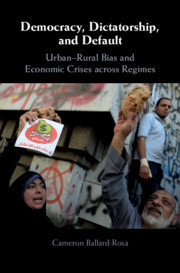Book contents
- Frontmatter
- Contents
- List of Figures
- List of Tables
- Acknowledgements
- 1 Introduction
- 2 Political Survival,Mass Politics, and Sovereign Default
- 3 Regime-Contingent Biases and Sovereign Default, 1960–2009
- 4 Default Pressures in Closed versus Electoral Autocracy: Zambia and Malaysia
- 5 Default Pressures in Consolidated versus Contentious Democracy: Costa Rica and Jamaica
- 6 Urban–Rural Pressures across Regime Types: The Case of Turkey
- 7 Conclusion
- Bibliography
- Index
5 - Default Pressures in Consolidated versus Contentious Democracy: Costa Rica and Jamaica
Published online by Cambridge University Press: 31 July 2020
- Frontmatter
- Contents
- List of Figures
- List of Tables
- Acknowledgements
- 1 Introduction
- 2 Political Survival,Mass Politics, and Sovereign Default
- 3 Regime-Contingent Biases and Sovereign Default, 1960–2009
- 4 Default Pressures in Closed versus Electoral Autocracy: Zambia and Malaysia
- 5 Default Pressures in Consolidated versus Contentious Democracy: Costa Rica and Jamaica
- 6 Urban–Rural Pressures across Regime Types: The Case of Turkey
- 7 Conclusion
- Bibliography
- Index
Summary
I begin this chapter with a case study of Costa Rica, a country almost universally admired for its peaceful and democratic political system.In such a consolidated democracy, I demonstrate that political attention to rural voters played a crucial role in the electoral success of the dominant PLN party; however, when faced with fiscal crisis in the 1980s, inability to reform agricultural pricing policies (as well as wage policies for electorally-crucial public sector unions) ultimately drove Costa Rica into default.The chapter concludes with discussion of contentious democratic politics in Jamaica, where political violence often organized by parties in urban centers unfortunately often plays a role.In such a system, the importance of limiting urban unrest through cheap food policies became a clear target under both PNP and JLP rule.Under severe fiscal crisis in the 1980s, Jamaican rulers proved unwilling to reform pricing policies beneficial to urban interests out of fear of societal unrest that would result, driving Jamaica to default not only to its external creditors, but also on its loans from the IMF itself.
- Type
- Chapter
- Information
- Democracy, Dictatorship, and DefaultUrban-Rural Bias and Economic Crises across Regimes, pp. 116 - 156Publisher: Cambridge University PressPrint publication year: 2020



